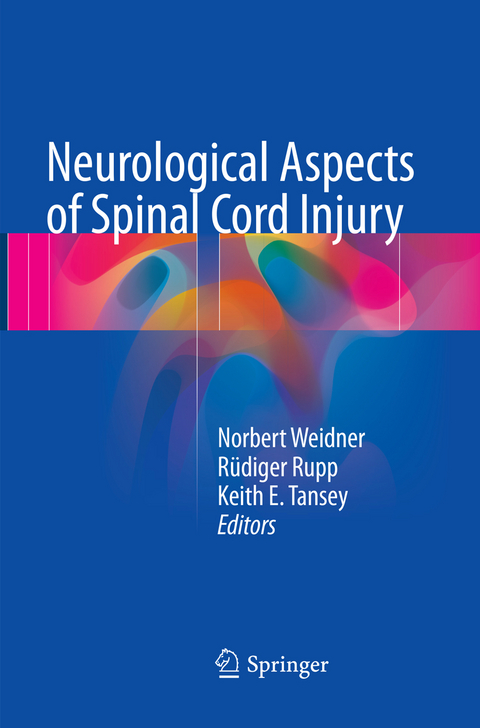
Neurological Aspects of Spinal Cord Injury
Springer International Publishing (Verlag)
978-3-319-83486-3 (ISBN)
Prof. Norbert Weidner, a board certified neurologist, has been medical director and head of the Spinal Cord Injury Center at Heidelberg University Hospital since 2009. He oversees both the comprehensive care for acutely and chronically spinal cord injured individuals as well as all research activities concerning neuroregeneration and neurorehabilitation in spinal cord injury. He received his medical degree at the University of Würzburg in 1995. He completed his residency at the Neurology Departments at Würzburg and Regensburg University Hospital and the Neuropathology department at Heidelberg University Hospital to become a board-certified neurologist in 2004. A three-year-long postdoctoral fellowship at the Department of Neurosciences, Center for Neural Repair, University of California, San Diego (1996-1999) shaped his research focus towards regenerative therapies following traumatic spinal cord injury. Accordingly, he successfully finished his postdoctoral studies with a thesis on "regenerative strategies for axonal repair in the injured peripheral and central nervous system" in 2005 at Regensburg University Hospital. He is the author of more than 80 research papers and is the editor of recent textbooks focusing on repair strategies for the injured spinal cord and neurological aspects of spinal cord injury. He is a member of the German Speaking Society for Paraplegia (DMGP), Germany Society for Neurology (DGN), Germany Society for Neuroscience (NWG), Society for Neuroscience (SFN) and the International Spinal Cord Society (ISCOS). He currently coordinates all clinical guideline activities at the DMGP. He has received several spinal cord injury related research awards. He was principal investigator in a phase I anti-Nogo trial and is currently running a subsequent multi-center phase II trial, in addition to several clinical trials investigating neurorehabilitative interventions. Rüdiger Rupp received his diploma in electrical engineering with a focus on biomedical engineering and his Ph.D. from the Karlsruhe Institute of Technology (KIT), Germany, in 1994 and 2008, respectively. From 1994 to 1996 he was a research assistant at the Institute for Biomedical Engineering and Biocybernetics at the KIT (head Prof. G. Vossius). Since 1996, he has been with the Spinal Cord Injury Center (former director: Prof. H.J. Gerner, current director Prof. N. Weidner) at Heidelberg University Hospital, Germany, where he heads the Experimental Neurorehabilitation Lab. He is the author of more than 100 journal articles and book chapters and holds two patents. His main research focus is on the development of innovative technologies to help individuals with spinal cord injuries. His interests include neuroprosthetics mainly of the upper extremities, application of functional electrical stimulation for therapeutic purposes, development of novel neuroprosthetic user interfaces including brain-computer interfaces, development and clinical validation of novel methods and devices for locomotion therapy, gait analysis in patients with incomplete spinal cord injuries, and the realization of software projects for the standardized documentation of rehabilitation outcomes. Dr. Rupp is a member of the IFESS, VDE, DMGP, DGOOC, ISCoS and ASIA. He received the Innovation Award for Medical Technology from the German Federal Ministry of Research and Education (BMBF) in 2005, the Konrad-Biesalski Award from the German Society for Orthopedics and Orthopedic Surgery (DGOOC) and the Innovation Award from the German Spinal Cord Injury Foundation (DSQ), both in 2008. Dr. Keith E. Tansey, MD, PhD, is a Senior Scientist in the Center for Neuroscience and Neurological Recovery at Methodist Rehabilitation Center, a Professor of Restorative Neurology in the Departments of Neurosurgery and Neurobiology at the University of Mississippi Medical Center, and an Attend
Part 1 Basics: Epidemiology.- Neuroanatomy.- Pattern of Neurological Dysfunction.- Natural Disease Course.- Part 2 Non-traumatic spinal cord injury: Ischemia.- Neuroimmunology.- Cord Compression (metastasis, hemorrhage, empyema, spondylodiscitis).- CNS tumors (glioma, ependymoma).- Pearls: myelopathy.- Part 3 Diagnostics: Blood/CSF workup.- Spinal Cord Imaging.- Spinal Cord Neurophysiology.- Part 4 Neurological Complications: Pain.- Spasticity.- Syringomyelia.- Neurogenic respiratory failure.- Part 5 Autonomic nervous system dysfunction: Neuro Internal Medicine (cardiovasc, endocrine).- Neurourology.- Neurogastroenterology.- Part 6 Therapy: Neurorehabilitation - upper extremity restauration.- Neurorehabilitation - lower extremity restauration.- Neuroregeneration.- Neuroprotection.- Neuroprosthetics.- Translation - relevance of SCI animal models.- Translation - clinical trial design.
| Erscheint lt. Verlag | 12.6.2018 |
|---|---|
| Zusatzinfo | VIII, 770 p. 102 illus., 61 illus. in color. |
| Verlagsort | Cham |
| Sprache | englisch |
| Maße | 155 x 235 mm |
| Gewicht | 1575 g |
| Themenwelt | Geisteswissenschaften ► Psychologie ► Klinische Psychologie |
| Medizin / Pharmazie ► Medizinische Fachgebiete ► Neurologie | |
| Medizin / Pharmazie ► Physiotherapie / Ergotherapie ► Rehabilitation | |
| Schlagworte | Non-traumatic spinal cord injury • Paraparesis • Rehabilitation • spinal cord medicine • Tetraparesis • Traumatic Spinal cord injury |
| ISBN-10 | 3-319-83486-X / 331983486X |
| ISBN-13 | 978-3-319-83486-3 / 9783319834863 |
| Zustand | Neuware |
| Haben Sie eine Frage zum Produkt? |
aus dem Bereich


